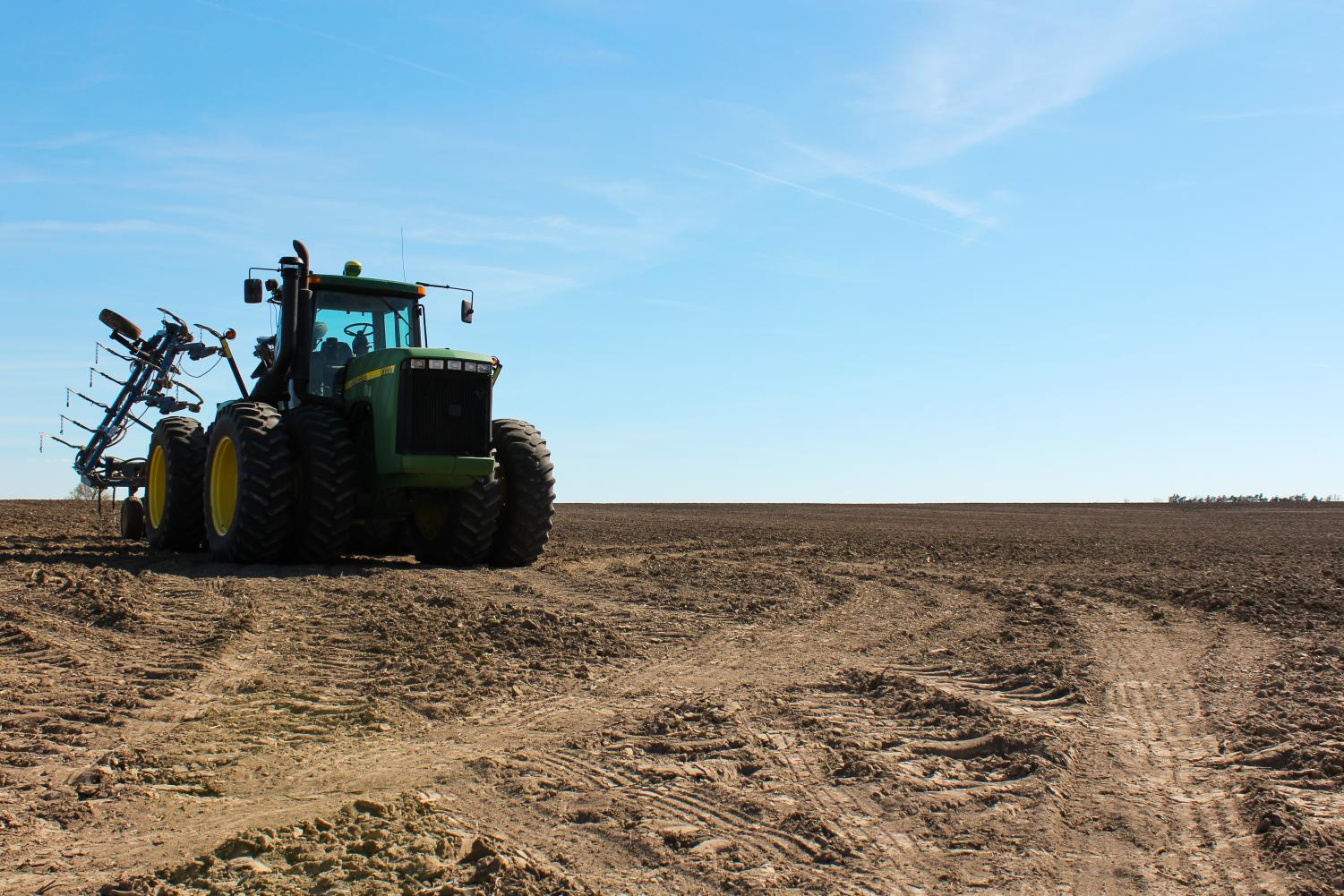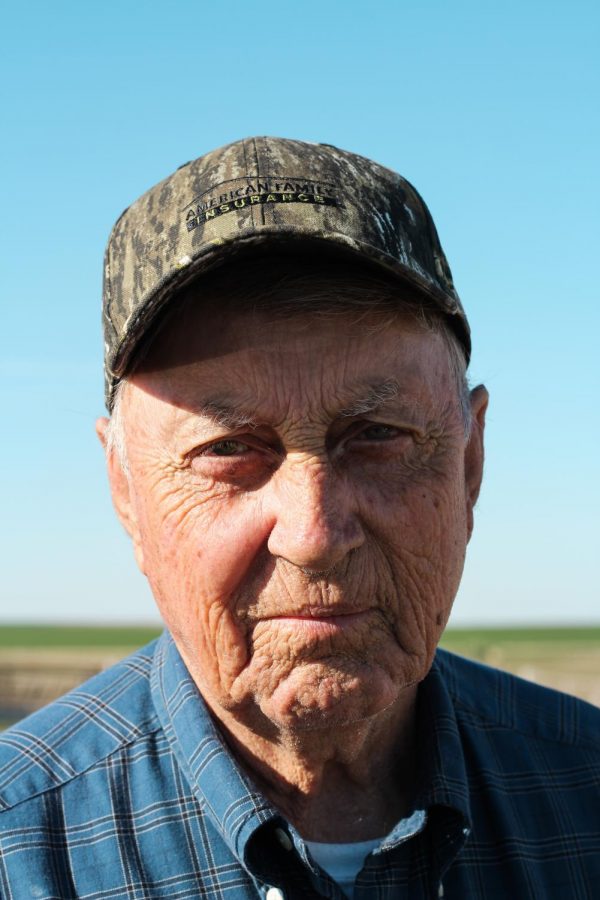Living through climate: the effects of the weather on the Midwest
Recent climate has affected citizens of the Midwest in a variety of ways, with some thinking it points to the larger issue of climate change.
April 29, 2019
Richard Budke has been a farmer for most of his life. For 60 years he’s grown soybeans, wheat and raised livestock in Jewell County, Kansas.e’s enjoyed working for himself, but because of the previous harsh winter and excessive snow, Budke said this is one of the worst seasons he’s ever had.
“You can’t believe how bad this winter really was on everything, you really can’t,” Budke said.
Like he has every year, Budke had his calves arrive around the beginning of February. However, the intense cold affected the calves tremendously, leading Budke to house them in his garage.
“My wife wasn’t really happy but she didn’t complain and she thought the calves were cute, so we just let them in there and got them warm and took them back to their mommy,” Budke said.
In the end, Budke lost 10 calves which he estimates to be a loss of about $10,000. Budke said he kew knew farmers who lost 20 calves, which can cause financial problems.
“If a cow loses a calf, you’ve got two years that you’re not going to have any profit from it,” Budke said. “So what do you do? Do you sell her? What do you do?”
After with the snow and cold came flooding, which washed out Budke’s wheat and creek crossing, taking all the wheat from terraces and breaking a few, creating ditches. Budke said all of this will impact his sales.
“I will have to work more ground,” Budke said. “It won’t be good because the prices are down and I don’t have as normally calves to sell as I usually do and that affects us the most.”
Other parts of the Midwest are also facing intense floods. Kevin Low, a scientist with the National Weather Service’s Missouri River Basin Forecast Center, told The New York Times that the Midwest set 30 new records for flooding in Nebraska, Iowa and South Dakota in the past week. The floods have devastated the farms and led to towns being submerged underwater.
“They’re completely under water there,” Budke said. “A lot of people said they won’t plant any crops up there this year. [There’s a guy who had] 900 hogs and now he only has 13.”
Budke also said the excess rain in the fall made it hard to plant wheat. He ended up having to plant it later, which lead to the land scarring, which could, in turn, make it harder to plant crops in the future.
“How are you going to fix that?” Budke said. “You can’t go over where it was. You have to work that ground over and over again to try and smooth it up. It’s been a hell of a year, let me put it that way.”
According to an article with the New York Times, Mary C. Erickson, deputy director of the National Weather Service, said the flooding was, “only a preview of what we expect
through the rest of the spring. In fact, we expect the flooding will get worse, and become more widespread.”
James Walton, a Registered Engineer for KC Water’s Stormwater Utility, also believes that rain severity will only increase in the future.
“It is clear that there are more flooding problems in the future than in our past,” Walton said. “Just from real data, this is the case. And you see our spring rain in KCMO can have 16% to 41% more rainfall in the future.”
According to Walton, one of the issues Kansas City faces is outdated sewers.
“KCMO has 58 square miles of combined storm and sanitary sewers in areas of town developed generally long before the 1960s, like 1896 Westport,” Walton said. “So if you have a consent decree plan built for a particular current rain duration, climate change may create problems for you in the future.”
Walton believes that Kansas City, like most urban cities, was not very good at handling flooding in the past, but should learn from development methods and improve.
“Have they learned?” Walton said. “And if they have not? Who will pay? With money? Or with lives? They did not, initially, know better. But we do. We’ve no excuses with modern technology and capabilities. Floods are a very effective way to display nation, regional, federal, state and local mistakes of our past. And there will always be another flood.”
Carole Mehl is a Kansas City environmentalist who has tried to bring environmental change to Kansas City since she was 13. In the 70s, she helped start a women’s group called the Citizens Environmental Council, that focused on property issues, such as zoning. In the 80s, she joined the Solid Waste Management Commision, eventually bringing recycling to Kansas City after investigating what happened to the city’s waste.
Mehl is also currently a member in the 350 chapter of Kansas City. The group was founded by Bill McKibben in 2008, who Mehl describes as “a modern day prophet.” The group is based around keeping the planet at 350 parts per million of carbon.
“We are at 402 plus,” Mehl said. “350 [parts per million of carbon] is sustainable and we need to get back to that. That will be a matter of, as Mr. McKibben would say, collaboration of all types of people across all types of boundaries, faith groups, labor groups, universities, businesses, government, all putting pressure on the fossil fuel industry.”
According to the United Nations, the amount of greenhouse gasses in the atmosphere are the highest they’ve ever been in 3 million years, with carbon dioxide being the m
ost prevalent. The U.N. states that, “the concentration of GHGs in the earth’s atmosphere is directly linked to the global temperature.” The U.N. believes the rise of the global temperature has lead to warmer oceans, melted glaciers and rising sea levels.
According to “ClimateLook,” an article by Dan Walker, which focused on the direct effects of climate change on Kansas City, Kansas City is expected to feel similar climate change effects as most of the Midwest region. Temperatures are expected to rise in all seasons and precipitation will increase.
“Heat waves will become more frequent and summer nights will become hotter,” Walker said. “These projected changes in temperature and precipitation extremes can be expected to increase demand for summertime cooling, degrade local air quality and place additional stress on water supply systems, wastewater and stormwater management systems and flood control efforts.”
Walker’s “ClimateLook” states that temperatures in Missouri have already gone up 0.3 degrees Fahrenheit per decade and precipitation has increased from 40.1 inches to 44.5 inches. Walker examined the potential effects climate change could have with moderate emissions and with continued high emissions.
“Kansas City is projected to experience an increase in annual average temperature of 4 degrees Fahrenheit by mid-century (2021-2060) compared to that observed during the last four decades, regardless as to which emissions pathway tends to be more representative of actual emissions,” Walker said. “The increase is projected to be roughly 7 degrees Fahrenheit by the end of the century if moderate emissions are achieved or as high as 8 degree Fahrenheit if the rate of increase in emissions seen recently continues.”
According to “ClimateLook”, this would increase heat waves, hot days and hot nights. Cold nights would become milder and the frost-free period would be longer.
Similarly, if the annual precipitation increases as “ClimateLook” expects, Kansas CIty will have extreme rainfall amounts and increased days of excess rainfall.
“[S]prings overall are expected to be warmer and wetter, suggesting the potential for heat stress — a phenomenon currently associated with summer — will increase in the late spring months,” Walker said. “[S]ummers overall are expected to be hotter and drier, suggesting the potential for summer drought — a phenomenon of concern already — will increase over the rest of the century.”
In 2015, members of the United Nations Framework Convention on Climate Change, agreed on the Paris Agreement, which according to the U.N. agreed to, “combat climate change and to accelerate and intensify the actions and investments needed for a sustainable low carbon future.” There are 184 countries in the Paris Agreement, however President Donald Trump announced in 2016 that the U.S. would not be a part of it.
Currently, Senator Ed Markey and Representative Alexandria Ocasio-Cortez are pushing for the Green New Deal, which was announced Feb. 7, 2019. According to National Public Radio, they see it as a “massive policy package that would remake the U.S. economy and, they hope, eliminate all U.S. carbon emissions.”
Mehl said she tries to be environmentally conscious as much as she cna. She watches how much meat she has to reduce methane production from feedlots, drives a semi-electric car and buys furniture and clothes second-hand.
“What would be ideal would be to have solar panels on my garage and have an all electric car plug in,” Mehl said. “Plain and simple, anything we plug in is using coal and it’s the worst, along with methane. But it’s a fossil fuel and it’s a dirty one. Even when we clean up the ash, we still have the vapors.”
Mehl said she recognized that it’s hard to see the effects of climate change when you live in a privileged area as there’s going to be more industry in poorer areas.
“They don’t put landfills over here by St. Teresa’s, it’s going to the peripheries,” Mehl said. “With 350, McKibbin makes a huge issue of climate justice. If you don’t want it here, don’t put it in someone else’s backyard.”
Mehl says she wants to inspire young activists to get involved.
“Advocate at your place of worship, your school, your business, your parent’s business,” Mehl said. “Letter writing. Political activism. Litigate, litigate, litigate. It’s your world we are trying to persevere.”


Tanya Abrahams • Apr 30, 2019 at 12:51 am
Fantastic article – President Trump needs to get his clueless head out of the sand and act!